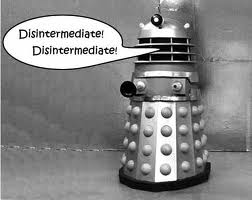
Any change, even for the better, is always accompanied by drawbacks and discomforts.
Arnold Bennett
Just Two Things
Somewhere in the rush to judgement and foolish reaction to Andrew Wylie’s deal with Amazon two major things have been overlooked.
The first is that Agents have as much to lose from the ongoing disintermediation of publishing as publishers do. That has important implications for how we should think about Wylie’s deal and the ramifications of it.
The second is that regardless of this deal the technology and the motivation exist to enable this ongoing disintermediation. If Wylie were to chose not to push it on, someone else would. IT IS UNSTOPPABLE.
I want to explore those two ideas a little more.
A little explanation: Agents & Power
The first is not so obvious. After all, agents are central to one of the relationships that is a key driver in the industry. They own or mediate the author-publisher relationship. That makes them pretty powerful in the scheme of things.
What’s more, they are clearly on the author’s side of that relationship and as an individual author gains power (if they are, for instance successful or critically acclaimed) so too the agents gain power. So the gradual shift of publishing power away from large publishers and towards established name authors and less powerful more fractured publishers (whose individual power is weak but whose collective power is potentially strong) agents’ position would appear to be stronger.
However the same disintermediation that threatens publishers threatens that relationship that is the core of the agents power. If they cannot provide the services that a powerful name author (or even a non-name author) requires, then that author is as likely to avoid the agent as they are to avoid a publisher.
As the publishers weaken and the authors grow more powerful, the need for an agent to negotiate a deal becomes less pressing. So disintermediation is not always the agents’ friend.
The challenge can be faced by expanding the agent’s role and that is what Wylie is doing. Yes it is fraught with potential conflict, both in interets and with partners, but the course is a brave and ultimately from an agents perspective necessary.
We should remember that strategic hole and how we might move to straddle it when we think about Odyssey Editions and Wylie.
Inevitability: Ability & Motive
Anyone with time and energy can now self publish. The tools of self-publishing, both in print and digital have been getting easier to access for some time. In the digital realm they are free (as in beer) and open. WordPress the platform that powers this blog enables publishing to the web by anyone. Of course that hardly guarantees an audience but the potential is there.
Even if the industry was not stacked in favour of publishers (at least when an author first encounters them) there would be the glimmer of financial incentive to authors to exploit contract loopholes or negotiate such loopholes as might allow them to test the waters, or, as time goes on and digital markets show their worth, ignore the old model for something new.
As publishers weaken and show themselves less agile than they might be in this period of digital, authors holding grudges or just out of self interest and self preservation. They are also beginning to question the value provided by publishers and booksellers. They are beginning to wonder if they might not be better served by other models, ones that are better suited to the digital age.
So the tools to enable the disintermediation of publishing industry exist and the motivation exists for people to do it. Those two conditions make it likely to occur, regardless of Andrew Wylie.
Thoughts
If adaption is the key to survival then we should be looking at Wylie’s move as a brave effort at change. If, one day, a publisher were to make a dramatic bid for relevance in this changing space, I wonder would they be condemned as Wylie has been?
I expect to see more experiments from agents. What’s more I expect to see more experiments from publishers and authors. If we don’t then I expect them to perish.

































As I see it the big change that is now occurring is that while previously Publishers held the keys to distributing writer’s works to a paying public, now there is a new entity able to deliver paying customers .. the eBook retailer.
What has not changed is that it is mainly successful authors that have these choices because they have established readerships. Clearly they now have a serious new option of bypassing the Publisher and selling direct via the eBook retailer (like amazon).
For lesser authors (i.e. the vast majority) the situation must remain quite muddied. Are Agents going to edit and shape an author’s work to prepare it for sale via eBook retailers? What is the risk of destroying a relationship with a Publisher by bypassing them and selling to eBook retailers ? Is it worth destroying that relationship if the Publisher then stops pushing hard copies ? Clearly this is a high risk strategy until there will be a tipping point somewhere in or around 5 or 10 years time.
As this process unfolds and we approach this tipping point, then there are two major issues that need to be restructured. If Agents are to take on this new role of bypassing Publishers they will need to offer new services that used to be offered by Publishers (e.g. editing) and they will need to find a way to get their author’s works promoted.
It’s not a huge stretch to imagine an Agent offering these additional services but clearly their fee will have to increase. The question of who will pay for the marketing of the author’s title is a bit more uncertain. I cannot see any Agent getting involved in this kind of speculative expenditure, can you ? So who is left ? Only the eBook retailer.
So we are now left with the question of how is the eBook retailer to fund the marketing ? when it carries thousands of titles ? Keep in mind that within a year or two it will inevitably be illegal for titles to be only available through exclusive deals with eBook retailers ? (for example there is no way the EU will ever allow this to continue).
It’s not so easy to find a solution to this dilemma. But two things are clear. Firstly the eBook retailers can only give sporadic promotion to a small group of it’s titles. Secondly they will inevitably require a higher margin to cover this marketing. This is a good time to remember that we have now increased the margin taken by the Agent for additional services previously delivered by the Publisher and we have also to increase the margin taken by the eBook retailer to pay for the marketing previously done by the Publisher …
Lastly who is going to fund media tours by book writers promoting their new book ? tours of tv and radio stations ? what will replace in-shop promotion days ? who will pay for newspaper adverts for new titles by moderately new writers ?
We may be eager to cheer the removal of Publishers from the scene because of their appallingly slow reaction to the new market and their inept strategies for pricing and DRM control – but as entities that promote author’s titles across all media I find it difficult to see how they can be replaced by anything other than a new entity doing the same job by another name.
In conclusion it seems to me that the best solution for writers is not the removal of Publishers from the scene at all. The best solution is a reborn Publisher with a tech savvy strategy, who offers all the traditional services of a Publisher including marketing, but who is far leaner, more efficient and responsive to the new eMarket and the transition that will be happening over the next 20 years. Like so many other industries going through this kind of restructuring, this offers huge opportunities for small or medium sized Publishing houses to bring in new management blood, cut out the rotten timber, dive into the new world order with energy and gusto and knock the old farts of the Publishing business on their arses.
Yes, disintermediation can happen at any level in the chain. And it *is* happening.
What is B&N’s PubIt or Amazon’s Encore but a step to bypass the entire supply chain between author an retailer?
Or how about estabished authors who sell their own backlist directy (Closed Circle, anybody?)
Or publishers who sell directly to consumers? (Baen?)
In the ebook supply chain only two elements are indispensable; the author and the reader. Everybody else, from Agent to retailer, has to justify their existence on a daily basis.
Welcome to the wonderful world of ebooks, where nobody is entitled to anything and everyone has to earn their keep.